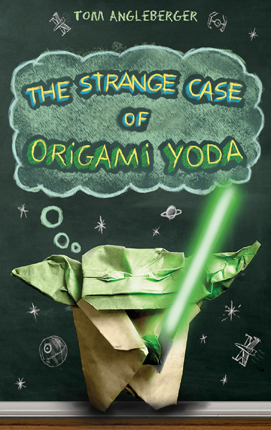| Strange case of Origami Yoda (Origami Yoda) Author: Angleberger, Tom | ||
| Price: $16.39 | ||
Summary:
Sixth-grader Tommy and his friends describe their interactions with a paper finger puppet of Yoda, worn by their weird classmate Dwight, as they try to figure out whether or not the puppet can really predict the future.
| Accelerated Reader Information: Interest Level: MG Reading Level: 4.70 Points: 3.0 Quiz: 136271 | Reading Counts Information: Interest Level: 3-5 Reading Level: 4.60 Points: 6.0 Quiz: 50239 | |
Common Core Standards
Grade 3 → Reading → RL Literature → 3.RL Key Ideas & Details
Grade 3 → Reading → RL Literature → 3.RL Craft & Structure
Grade 3 → Reading → RL Literature → 3.RL Integration & Knowledge of Ideas
Grade 4 → Reading → RL Literature → 4.RL Key Ideas & Details
Grade 4 → Reading → RL Literature → 4.RL Range of Reading & Level of Text Complexity
Grade 4 → Reading → RL Literature → 4.RL Craft & Structure
Grade 4 → Reading → RL Literature → 4.RL Integration & Knowledge of Ideas
Grade 5 → Reading → RL Literature → 5.RL Key Ideas & Details
Grade 5 → Reading → RL Literature → 5.RL Integration & Knowledge of Ideas
Grade 5 → Reading → RL Literature → Texts Illustrating the Complexity, Quality, & Rang
Grade 6 → Reading → RL Literature → 6.RL Range of Reading & Level of Text Complexity
Grade 6 → Reading → CCR College & Career Readiness Anchor Standards fo
Grade 5 → Reading → RL Literature → 5.RL Range of Reading & Level of Text Complexity
Reviews:
Kirkus Reviews (03/01/10)
School Library Journal (05/01/10)
Booklist (05/01/10)
The Bulletin of the Center for Children's Books (A) (06/10)
Full Text Reviews:
Booklist - 05/01/2010 Tommy and his friends think that Dwight is a weirdo who’s “always talking about robots or spiders or something.” In true Dwight fashion, he shows up at school one day brandishing a little origami Yoda finger puppet. The really weird thing is that it doles out very un-Dwight-like bits of wisdom, and the mystery is whether the Yoda is just Dwight talking in a funny voice or if it actually has mystical powers. The book is structured as a collection of stories gathered by Tommy and told by kids who either believe or don’t. See, Tommy has a more vested interest than just idle curiosity—he is dying to know if he can trust Yoda’s advice about asking the cute girl to dance with him at the PTA Fun Night. Origami Yoda—a sort of talking cootie catcher—is the kind of thing that can dominate all those free moments in school for a few weeks. Angleberger’s rendering of such a middle-grade cultural obsession is not only spot-on but also reveals a few resonant surprises hidden in the folds. Naturally, Yoda-making instructions are included. - Copyright 2010 Booklist.
School Library Journal - 05/01/2010 Gr 3–6— For Tommy, the only question is whether or not Origami Yoda is real. Of course he's real as a small puppet on Dwight's finger. But does the oracle possess magic power? In order to find out, he decides to compile scientific evidence from the experiences of those who asked Origami Yoda for help. His friend Harvey is invited to comment on each story because he thinks Yoda is nothing but a "green paper wad." Tommy also comments because he's supposedly trying to solve the puzzle. In actuality, the story is about boys and girls in sixth grade trying to figure out how being social works. In fact, Tommy says, "…it's about this really cool girl, Sara, and whether or not I should risk making a fool of myself for her." The situations that Yoda has a hand in are pretty authentic, and the setting is broad enough to be any school. The plot is age-old but with the twist of being presented on crumpled pages with cartoon sketches, supposed hand printing, and varying typefaces. Kids should love it.—Sheila Fiscus, Our Lady of Peace School, Erie, PA - Copyright 2010 Publishers Weekly, Library Journal and/or School Library Journal used with permission.
Bulletin for the Center... - 06/01/2010 Origami fortune-telling is a ubiquitous practice in elementary and middle schools, but instead of using the standard cootie catcher, the kids at McQuarrie Middle School ask their questions of Origami Yoda, an original creation of the class dork, Dwight. Tommy, the main narrator, has compiled a set of notebook-styled case files from various classmates to determine whether or not Origami Yoda is a genuine provider of advice worth following or is just another social gaffe of the unfortunate Dwight, who seems to have a special knack for being weird and embarrassing. Tommy’s mean, skeptical friend, Harvey, provides mean, skeptical commentary on the cases, and his other friend, Kellen, is purportedly responsible for the spot cartoons that decorate the pages. The set-up is thus openly contrived, but it could inspire an entertaining collaborative writing activity. The stories themselves are short vignettes of typical middle-school problems that have been solved, or not, by enigmatic advice delivered in the distorted syntax for which Yoda is famous; none quite rises to the level of particularly memorable or insightful, but the happy ending, for everyone but the undeserving Harvey, raises the possibility that Dwight is as wily as he is weird and it may just inspire a new kind of respect for the class oddball. Reluctant readers will appreciate the pacing and format, and since directions for making an Origami Yoda are included, a new lunchroom craze may appear in the offing. KC - Copyright 2010 The Board of Trustees of the University of Illinois.



